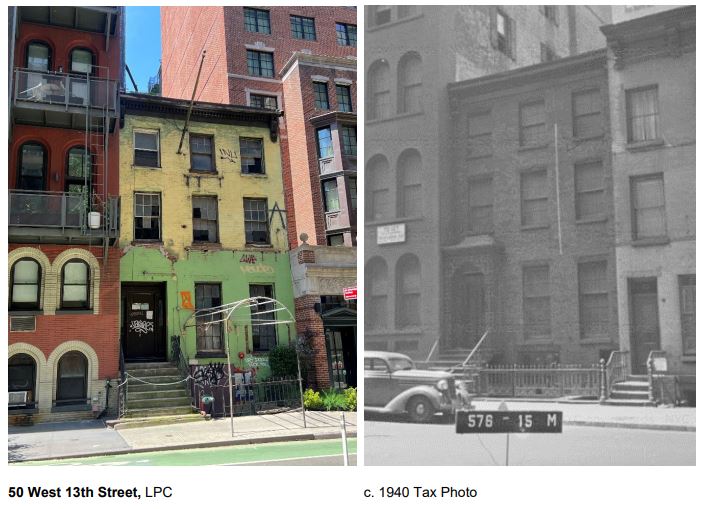
The Jacob Day Residence at 50 West 13th Street is currently in need of repair. A tax photo on the right shows how the building looked in the 1940s. Image Credit: LPC.
On June 18, 2024, the Landmarks Preservation Commission voted to calendar the Jacob Day Residence at 50 West 13th Street in Greenwich Village for future designation. The residence was the home and place of business of Jacob Day, a prominent Black caterer and property owner who advocated for the abolition of slavery and for voting rights and economic opportunities for African Americans. The three-story row house was built in the Greek Revival style in 1846.
Day was a member of the National Anti-Slavery Society at a time where it was dangerous for Black individuals to participate in abolitionist activities out of fear of physical harm and economic retaliation. He operated a very successful catering business out of the ground floor of 50 West 13th Street. At the time, catering was one of a few industries where Black men could build profitable businesses of their own. Day was a member of the Caterers’ Club, Freedman’s Bank, and a prominent member of the Abyssinian Baptist Church. After his death in 1884, Day’s sons, Charles and Jacob Jr., would carry on the business at this address until 1896. At the time of his passing, Day was worth an estimated $200,000 (the equivalent of over $6 million today).
In 1959, the building was renovated to include a theater in the basement level, a school on the first floor, and residences on the remaining two floors. The Afro-American Folklore Troupe had a residency until 1968 at the theater, where they performed poetry, folklore and other works by Black writers including James Weldon Johnson, Gwendolyn Brooks, Leroi Jones and Langston Hughes.
Between 1972 to 2020, the building was home to the 13th Street Repertory Company and operated as one of the city’s oldest “off-off-Broadway” theaters; the intimate venue featured only 26 seats. The company was founded by Edith O’Hara and featured many now prominent actors and performers including Bette Midler, Barry Manilow, Chazz Palminteri, Amy Stiller, and Richard Dreyfuss, among others. The theater was the opening site of the Israel Horovitz play “Line,” which opened in 1974 and was performed for almost 45 years. O’Hara passed away in 2020, which raised concerns in the community about the future of the building. The preservation advocacy group Village Preservation began to campaign for the landmarking of the Jacob Day Residence following O’Hara’s death.
Landmarks voted unanimously to calendar the Jacob Day Residence. The Commission spoke about the current condition of the building. According to Landmarks Chair Sarah Carroll, the current owner has plans to renovate and restore the facade and interior of the building. Chair Carroll also noted that while many buildings in Greenwich Village are from similar time frames, this property also has the notable history of Jacob Day’s success as a Black businessman from that era, which is not really reflected in the city’s other landmarks.
Village Preservation Executive Director Andrew Berman stated, “It’s wonderful to know that this fragile, neglected building with such a proud and rich history may finally be protected and preserved. After a nearly four-year effort, the city has at last taken the first official steps toward protecting this historic site, so strongly connected to our city’s and country’s often-forgotten Black history, civil rights history, the women’s suffrage movement, and of course our theater and cultural history. At 180 years old, No. 50 West 13th Street is the very definition of a landmark, and we’re heartened that it’s now being recognized and may well receive the permanent protections it needs and deserves.”
Landmarks will hold a public hearing for the building at a later date.
By: Veronica Rose (Veronica is the Editor of CityLand and a New York Law School graduate, Class of 2018.)

